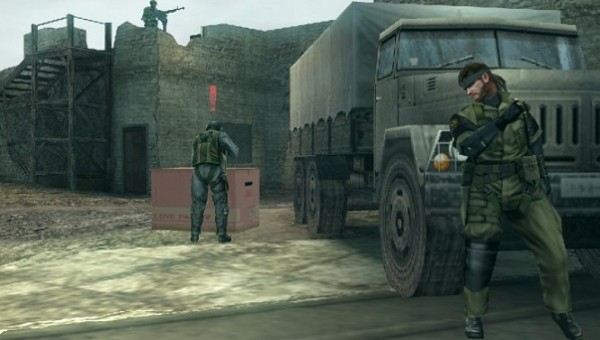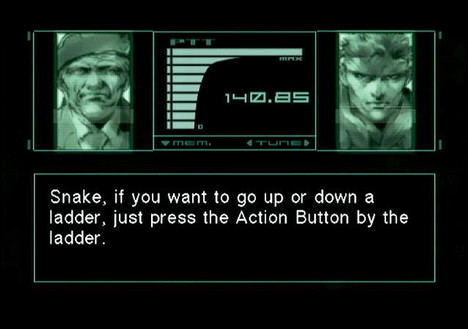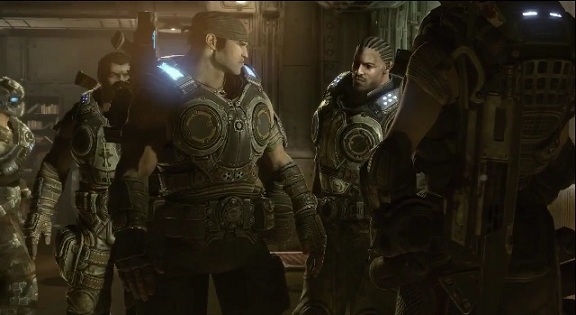While reading Clint Hocking’s column in the latest issue of Edge (#233) [and now available online], I felt myself getting angry. But the British sort of angry where you gain a sudden urge to write a strongly-worded letter to somebody or just write something. So I did a blog post.
His piece concerns game dialogue and why we may think it’s terrible when it is not. I can understand his perspective and some of his points but I can’t help feeling the main thrust of his argument is seriously flawed.
He starts off by asserting that game writers “understand the medium, and that good game dialogue almost automatically sounds like bad dialogue”. While I think it generally takes a certain amount of skill to be a professional writer in any form, I can’t help but feel many are not fully utilising all that games have to offer.
Of course, this is not always the writer’s fault. Often they may be brought into the development process quite late, with their job simply being to make the characters say things and offer some justification, no matter how feeble, for the scenarios the game designers envisioned.
Penny Arcade’s Tycho puts it best (and in rather uncharacteristically succinct terms):
As a generality, a game’s “writer” has a task similar to a composer for film: they “score” the game, a game that is already in various stages of completion, using language.
This is only the worst-case scenario and can’t be helped. Fortunately, many developers have seen the benefits of in-house writers being involved in the creative process from the beginning. Even so, if a writer joins a project near completion, it is the dialogue that is generally more flexible than any other element.
The example Hocking uses is that of a stealth game, whereby a guard has been alerted to the possibility of the player’s presence and will voice something along the lines of “Is someone hiding over there?” I certainly agree that this is both trite and on-the-nose but I most certainly do not feel that its use as player feedback is justified. He points out that if this were a film, a simple reaction shot from the guard would carry the same message but doing this in a game would take control away from the player or disrupt the flow. That may be, but games have so many other methods for giving players feedback.
Off the top of my head, Deus Ex: Human Revolution makes use of a mini-map on which the arrows for enemies will change colour depending on their state, and a message appearing above this (SUSPICIOUS/ ALARMED/HOSTILE). Even earlier than that, the Splinter Cell series (on which Hocking had worked) made use of a threat indicator, which Double Agent (the entry after Hocking moved onto the FarCry 2 team) shifted onto Fisher’s back, with colours changing to signify if you are safe, have a possibility of being spotted or have been spotted; a system which was even repurposed, and later altered, for Ubisoft’s Assassin’s Creed series. Going further back still, Metal Gear Solid displays icons above the guards heads (you know the ones), however crude that may be, as well as guards’ cones of vision on the mini-map changing colour.

Although all the above have them, there is absolutely no need for chatty enemies. The ‘gaps’ in the AI for stealth games, deliberate or not, already undermine the guards enough without the dialogue. When developers are looking for ways to legitimise common gameplay elements (mini-map and regenerating health are augmentations in Deus Ex: HR) or make them diegetic (Fisher’s threat indicator in Splinter Cell, or Isaac’s health bar in Dead Space) to try and increase ‘immersion’ it seems odd to overlook such incongruous dialogue.
Hocking’s point feels symptomatic of a problem with dialogue in a lot of games. To illustrate, let me submit another related example of unnecessary/poorly-phrased dialogue from a recent release: Gears of War 3. During the opening section, the squad discovers a fire blocking their path through a doorway, to which our protagonist Marcus barks, “There‘s a fire! Grab the extinguisher!”. If in single-player, Marcus’ squad mates proceed to stand around doing nothing. Fortunately, the game has already popped up an objective (‘Find a fire extinguisher’) and then marked it for you on the screen even though the bright red object sits dead ahead in this enclosed space. Then you, as Marcus, wind up having to put the fire out yourself. A fire which also has a handy star above it, in case you missed it.
Obviously, I did not expect the AI to handle the task for me, but Marcus’ dialogue is clearly aimed as an instruction to the player. It does not fit in the world of the game in the same way as the character’s occasional banter. The only situation where it would work requires a friend, controlling another character in co-op, obeying Marcus’ orders. Even a slight rephrase of this would’ve fixed all the issues: “There’s a fire! Find an extinguisher!”
I’m not saying that the Gears of War series is some hallmark for game dialogue, when it has always been guilty of using this form of blunt instructional dialogue, but this is just one example of supplying the player with excessive information for the most obvious of tasks. Games have multiple means of conveying a required action and developers should be sticking to one, not as many as possible.
The same opening segment involves another fault in dialogue, although not one limited to games: clunky exposition. When Marcus and the gang discover former-COG Chairman Prescott is landing on their ship, Dom exclaims, “That asshole! He ran out on us 18 months ago. What’s he expecting now, (the) red carpet?”. While a little blunt it is, in some regards, effective dialogue. We haven’t seen Prescott yet (in this game anyway) and already we get that these characters do not like him and that the man thinks himself important. Additionally, the fact that he’s been absent is of significance (although the same conversation already includes the comment “ex-Chairman”), it’s just lucky that Dom knows the exact amount of time the guy had been away, since people who have only been playing the games would not know the current situation or timeframe. The main factor that trips it up is that everyone there already knows he ‘ran out on them’. No one but the player needs to hear this information.
When we are finally introduced to Prescott, the dialogue carries even more of this background information and, yes, again, these characters don‘t like the man. Plus, if we didn’t know already, from our quick tour of the ship: the COG forces (essentially the human military on the planet) have been falling apart. We shouldn’t need this information twice. If some players managed to miss the little touches seen during the opening walk through the ship (most of which are glaringly obvious), that’s their fault. They should be encouraged to delve deeper and find out what exactly has been going on, not accomodated for with stiffly-delivered infodumps. Funny thing is, I would not even consider Gears of War the worst offender in this regard.

Hocking states that the ‘obvious’ dialogue is the game form of the “show, don’t tell” mantra of film and TV. But this can still apply to games via the medium’s own more capable visual tools. I can’t help but feel the main problem is the fear that players will get lost if too much is left unanswered right away; be it in gameplay or story. In Gears of War 3’s case, I hadn’t read any of the related literature, but knowing the dire circumstances surrounding the characters was enough to keep me interested in seeing what happens. There is a moment later on where two characters, one of which I’d never seen before, share a quick, supposedly meaningful, exchange. Presumably this was related to some of the non-game material but it didn’t beat me over the head with what was going on. What the characters were doing made sense (although the reason they were there in the first place was a bit flimsy) and appeared to ring true, but I would have to look elsewhere if I wanted the full story. And that’s how it should be.
Funnily enough, I’m now stumbling into ‘dialogue has to be like this to cater for the audience’ territory, which is part of Hocking’s argument and also true. Sometimes, and in some cases, games do need things in clear terms in order to be accessible and understood by a large audience. An audience composed of all sorts of people. Some of whom need a constant reminder of what they are doing and why. But, no, I’m putting my foot down. We should be asking more of our games and this is something we should come to expect.
I’ve used this quote from TV writer, Jimmy McGovern, before but it is perfectly apt:
I’d rather be confused for ten minutes than bored for five seconds.
As gamers, we’ve become too accustomed to having the answers right away. Too often there are no surprises or ambiguity. Anyone who has seen The Wire can attest to how it manages to craft wonderfully in-character dialogue without worrying about losing the viewer. If something doesn’t make sense straight away, you keep watching until it inevitably does.
Bad writing and dialogue automatically assumes that gamers are the people who sit in the cinema, having to ask their companion, who has not seen any further ahead, about the film; who someone is and why they did that, convinced they’ve missed something instead of showing any patience and waiting for answers. It is catering to the lowest common denominator.
Yes, gamers need some form of feedback, but there are so many other avenues to explore before leaving dialogue to do all the heavy-lifting. Hocking’s answer to ‘fixing’ bad dialogue is to “play more games until our cultural sensibilities change and our expectation of what good dialogue is evolves to include the kinds of lines we hear everyday in games.” However, I cannot get behind this. If you think such terrible dialogue is acceptable, then you’re just not trying hard enough. Games shouldn’t aspire to be films but they should try and be just as concise with their information.
I would just like to clarify, I have a great deal of respect for Mr. Hocking and, clearly, he means well. Additionally, neither was all of this aimed at him; I felt I should take the opportunity to expand on the topic.
I’ll leave you with one final thought, inspired by Hocking’s mention of some film dialogue examples. It’s not directly related to what he was saying (like that stopped me) but I may expand on it later: Why is it usually the case that we remember so many iconic lines and exchanges from films (not even including voice-overs or narration) yet it is usually the bad Japanese-to-English translations (“All your base are belong to us”) from games that spring to mind? I’m not claiming games have no standout bits of dialogue, plus it’s generally the actual gameplay moments we remember most fondly, but it’s certainly something to consider.


Just want to share the best Gears dialogue:
Dominic Santiago: [scoffs] Hey Marcus, you ever seen them eating Imulsion?
Marcus Fenix: They can eat shit and die for all I care.
Classic.
I largely agree with this. AAA games pitch the game to us with the storyline and this sort of dialogue really takes away from the immersion. However, I think for indie games and the like that don’t have the production cycles that the AAAs have, I’m far more forgiving for exposition.
Also, if it’s a game where lampshading and audience-winks are established (like Metal Gear Solid) then these things are acceptable.
Also, why doesn’t anyone complain about the exposition in Bastion? Frig!
Thanks so much for blogging about this! I had the exact same reaction whilst reading the article and was trying to track it down online so I could send it to a friend in Montréal. Now I can just link him to your blog post instead and rant less in my email. ;)
Hehe. Happy to be of service, and I’m glad to hear someone agrees.